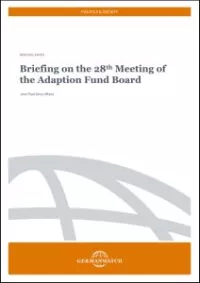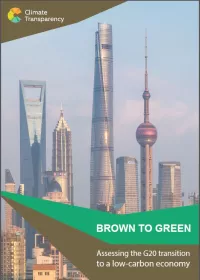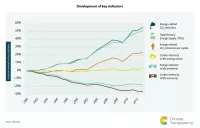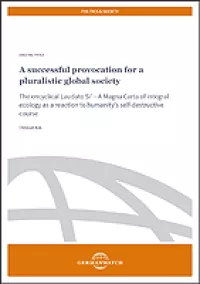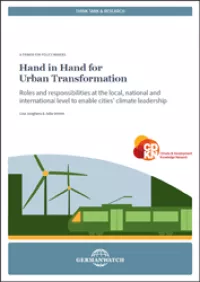
Aktuelles zum Thema
Publication
In August 2016, the Adaptation Fund has recorded its second largest number of proposals in its history. A number of 31 concept and project proposals have been received to be considered by the Adaptation Fund Board at its 28th Meeting scheduled in October 2016 in Bonn, Germany. This request amounts to US$ 208.6 million from various types of accredited implementing entities wishing to access the funds. It is obvious that the Fund provides an important function to assist developing countries in their efforts towards concrete local measures against climate impacts. Developed through a civil society lens, this briefing outlines selected talking points on agenda items that are to be discussed at the 28th meeting of the Adaptation Fund Board, and suggests some key recommendations as well.
Publication
The Basics +++ Rights and Equity +++ In your Country +++ How funding is decided +++ The Private Sector
After reaching full operationalization in 2015, the Green Climate Fund (GCF) is gradually moving from a design phase into the actual implementation of projects and programmes to address the adverse effects of climate change in developing countries. To reach its ultimate objective of achieving a paradigm shift towards low-carbon and climate-resilient development, these projects and programmes need to be imbedded in national development strategies and require the involvement of all national actors to be truly country-owned.
Blogpost
Blog post by Christoph Bals and Gerrit Hansen, September 2016
Global decarbonisation will stem from a wide array of policy instruments: regulatory frameworks, long-term low-carbon strategies, technology development and transfer and fiscal and market incentives. As long as the prices of established fossil fuel technologies remain far below their true cost to society, it will be difficult to push them out of the market. A coordinated effort to phase out fossil fuel subsidies and establish carbon pricing schemes and domestic floor prices throughout the G20 would be a major step forward.
Blogpost
Blog-Post by Yunwen Bai, Policy Director, (Greenovation Hub) and Lutz Weischer, Team Leader International Climate Policy (Germanwatch), September 2016
China is the host of this year's G20 summit. This more active role of China in global governance is a reflection of a changing world. The Hangzhou summit also reflects another significant change: Climate action and sustainable development are no longer considered side discussions, but are centrally on the G20 agenda. The G20, traditionally a forum to discuss financial stability and economic policy, are beginning to reflect the fact that unsustainable development and unmitigated climate change are huge risks to a stable and prosperous world economy.
Press Release
G20 countries as driver for global implementation of Paris Agreement - Joint proposal by industry association, environmental organization and research institute
The Federation of German Industries (BDI), Germanwatch and the Mercator Research Institute on Global Commons and Climate Change (MCC) are gathering forces to urge the G20 countries to introduce carbon pricing as a means to achieve the climate goals set forth in the Paris Agreement. The unusual alliance between an industry association, an environmental organization and a research institute seeks to drive ambitious climate protection, create more predictability for planning, promote fair competition and secure the necessary investments.
Publication
A Climate Transparency Report supported by Germanwatch
The report, “Brown to Green: Assessing the G20 transition to a low-carbon economy” has been produced by Climate Transparency, and written by a range of international experts and was launched at a press conference in Beijing. With climate change high on this year’s G20 agenda, along with green finance, the assessment looks at a range of indicators on climate action, including investment attractiveness, investment in renewable energy, climate policy, the carbon intensity of both the energy and electricity sectors of the G20 economies, of their fossil fuel subsidies and their contributions to climate finance.
Press Release
The G20 needs to make more effort to move to a green, low-carbon economy, especially in the areas of coal power expansion and climate policy, but is beginning to head in the right direction. This is the key result of a comprehensive assessment of G20 climate action, released in Beijing today ahead of the G20 summit in China this weekend. The report, “Brown to Green: Assessing the G20 transition to a low-carbon economy” has been produced by Climate Transparency, and written by a range of international experts and was launched at a press conference in Beijing.
Blogpost
Blog post by Gerrit Hansen and Lutz Weischer, August 2016
Representing two-thirds of global population, four-fifth of world GDP and more than three-quarters of total greenhouse gas emissions, the G20 – group of the leading industrialized countries and largest emerging economies is a central platform for the implementation of the Paris agreement. When G20 leaders meet at the Hangzhou summit from September 4th to 5th, climate change and decarbonisation have to rank high on the agenda. For the Paris Agreement to enter into force, it has to be signed by at least 55 countries representing no less than 55% of global GHG emissions.
Publication
The encyclical Laudato Si’ – A Magna Carta of integral ecology as a reaction to humanity’s self-destructive course
This background paper explores the potential relevance within a pluralistic society of the important encyclical Laudato Si’ issued by Pope Francis in June 2015. It considers whether the encyclical documents a reflected faith that accepts the primacy of science in secular knowledge as well as the primacy of democratically elected governments, human dignity, and human rights in the political sphere. Laudato Si’ presents a paradigm shift from the image of the dominion of mankind over the rest of creation to universal fraternity with even weak and marginalised people as well as fellow beings threatened with mass extinction.
Publication
Roles and responsibilities at the local, national and international level to enable cities’ climate leadership
The Paris Agreement which was adopted in December 2015 sets the pace for global action against climate change for the coming years and decades. In its preamble it underlines the importance of all levels of government engaging in and contributing to tackling the climate challenge. Given the significance of cities in emitting greenhouse gases as well as their vulnerability to the impacts of climate change, their role in advancing a low-carbon and climateresilient development should not be underestimated. An urban transformation is key as it will decisively shape the functionality of cities for the next 50 to 100 years.

